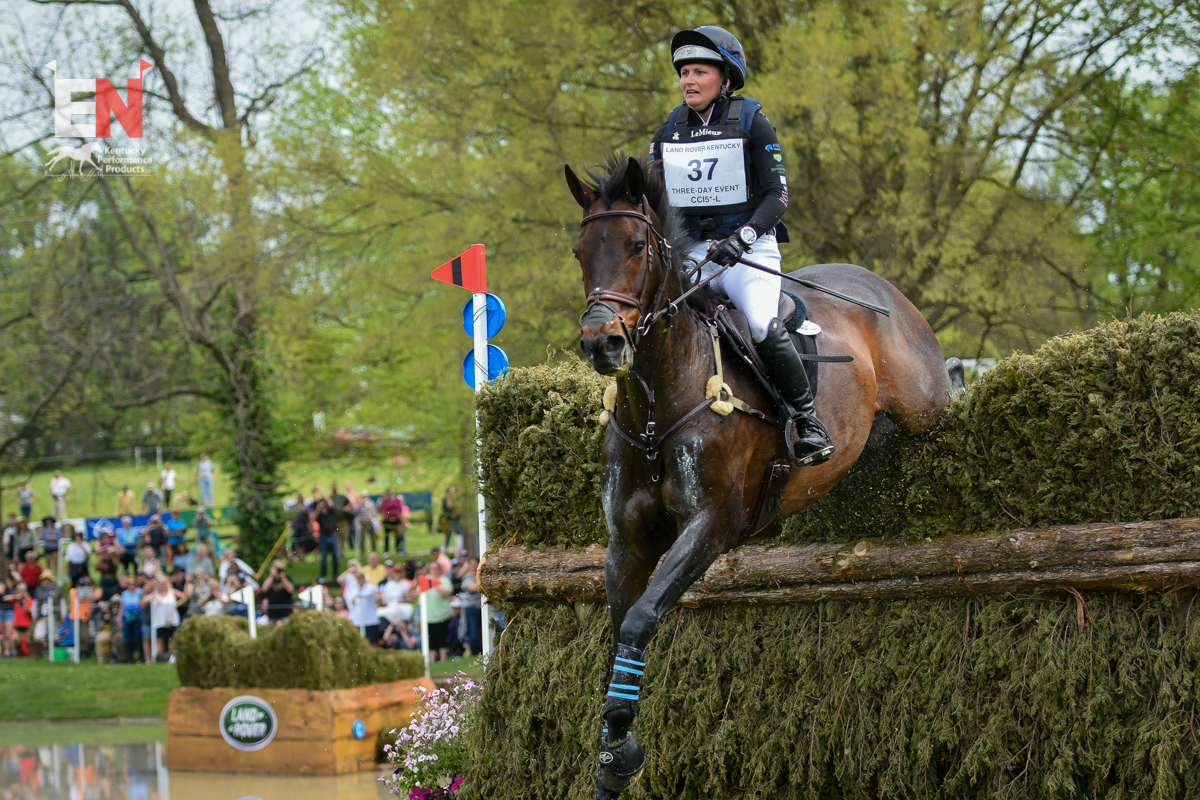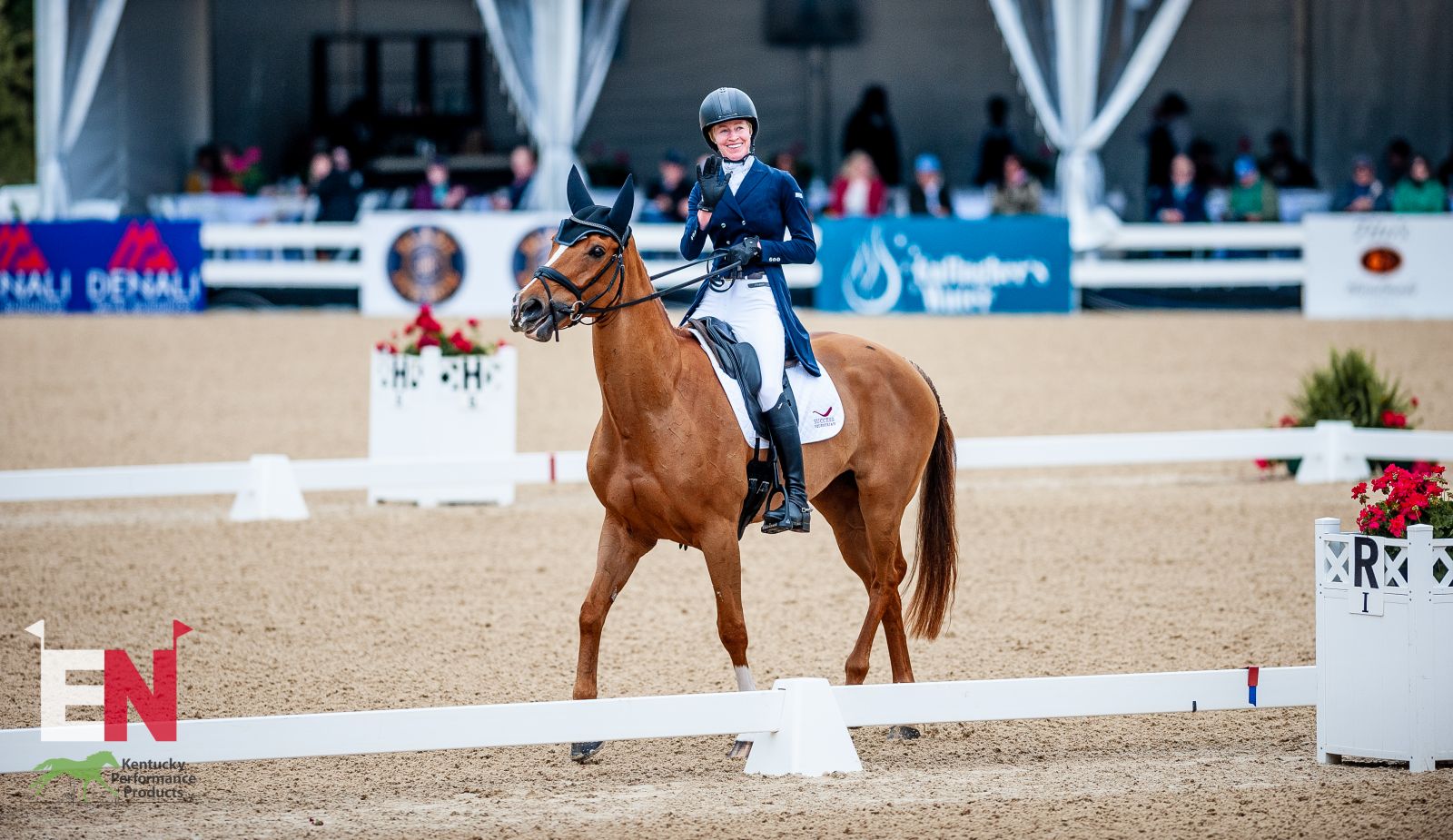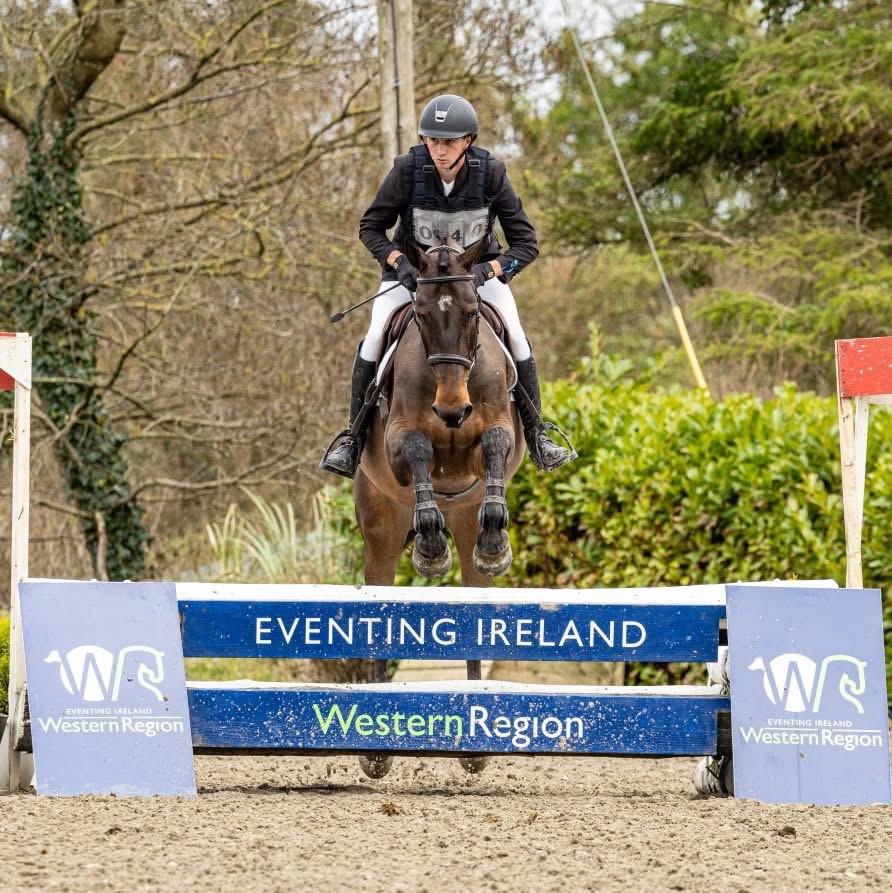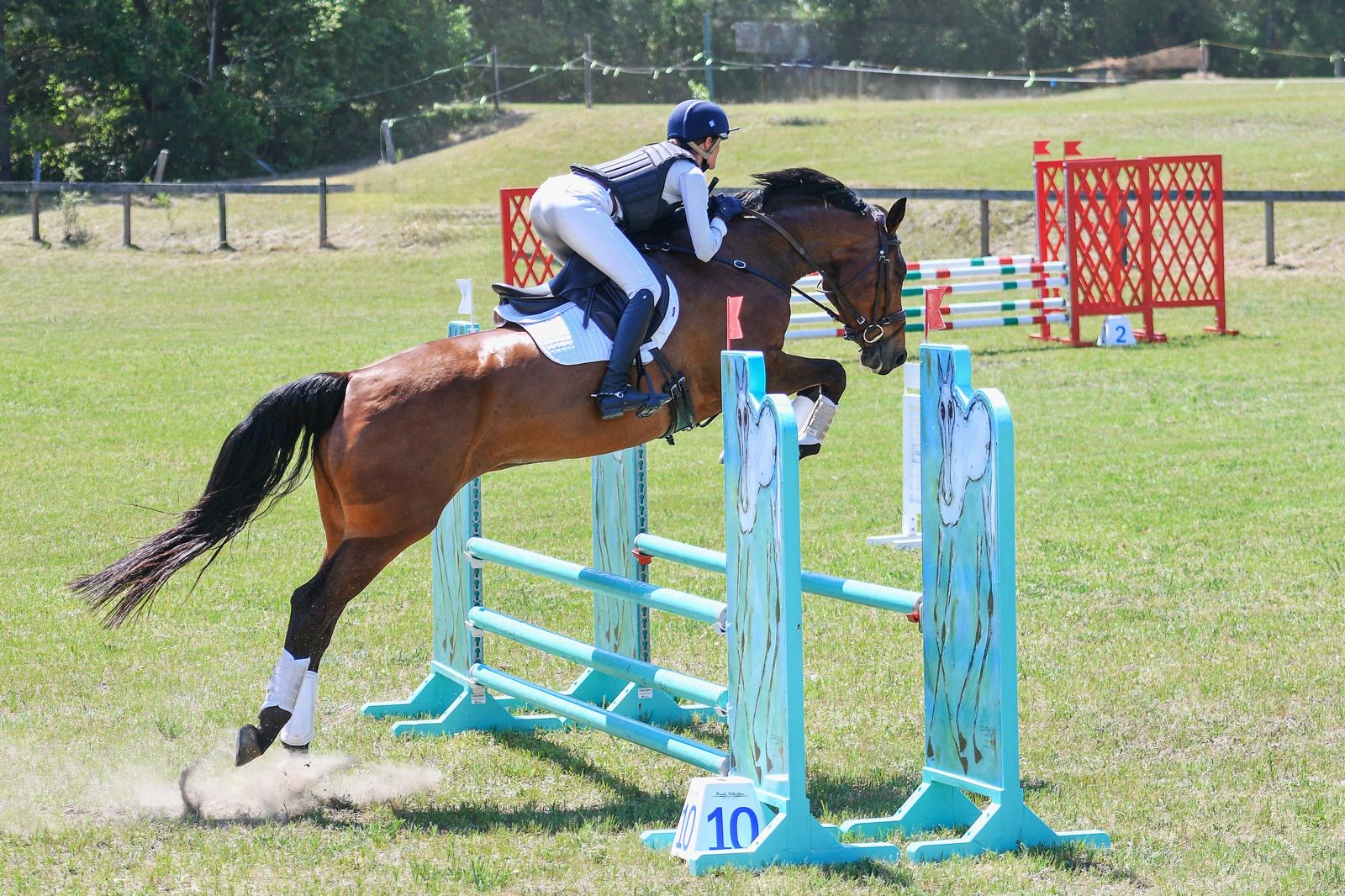It seems like these days we look at each other’s lives through the lens of a highlight reel. We get to see the incredible trips, the best jumps, and the moments that we’re proud enough of to put on social media. What we don’t talk about is how much pressure this adds to athletes on both ends of the news feed.
Riders, whether professional or not, are made to feel like they ‘have to’ post something that makes them look cool and successful. Then, as we consume this content, we are stuck with the disillusioned perception that the sport is easy and that if you’re not succeeding, then maybe you aren’t cut out for it. I would like to take this opportunity to go ‘between the ears’ of some of the riders that make up our Eventing Nation and work to understand some of the real challenges this industry presents.
To read more from the Between the Ears series, click here.

Meg Kepferle and Anakin. Photo by Abby Powell.
Megan Kepferle (you may know her as Meg Kep) started eventing as a kid. Despite being at a hunter jumper barn, she watched a VHS tape of Karen and David O’Connor and fell in love with the sport. Inspired, she did her first event with absolutely no preparation — and won!
With curiosity piqued, and an interest in finding more opportunities, Meg moved overseas after college to work with a British 5-star rider, where she quickly realized how much she didn’t know. Returning to the States (kicking and screaming with an expired visa) Meg went to DC to work a “real person” job, but when the economy crashed and everyone (including Meg) lost those DC jobs, she was forced to reevaluate.
Knowing that she wasn’t quite good enough at the time to be a professional rider, she took a job teaching at a lesson barn in New Jersey — and the doors started to open up from there. It was in New Jersey that Meg met Doug Payne, with whom she took her first position as a groom. While working for Doug, Meg was introduced to Sinead Halpin, joined her team, and spent the next six years traveling the world as an international groom.
Meg found herself at another crossroads when her mom passed away. Life events, whether good or bad, force us to change and adapt and Meg did just that — taking the time of reflection to make the jump from a primary focus of grooming to making a crack as a rider.
Meg now has an Advanced horse, Anakin, and a teaching and training business of her own in New Jersey. Her path hasn’t been straightforward, but she sure has learned a ton of lessons along the way. And with that, let’s go between the ears…

Megan Kepferle and Anakin. Photo by Abby Powell.
Can you tell me about a time that you lost your confidence in riding or competing and how you worked to overcome it?
“A couple of years ago, I had my first bad in-competition fall off of Anakin, at Morven Park. He’s the kind of horse that always does everything to keep me on his back, so I wasn’t used to falling off of him, and the times I had before it had never really been scary.
It was the year of Covid — and it’s hard to talk about how Covid affected my eventing career when so much was going on it in the world — but I had just hit my stride of feeling confident and planning for the future when it was all interrupted. Going back to compete in the fall, it just felt like I had lost a lot of momentum and I wasn’t quite as sharp. I had made it almost all the way around a very hard track and at the last combination, an angled brush combination, I rode exactly the way I wanted to and had planned to. I was wrong. Anakin added a stride, hit the jump and I went flying. The injury itself wasn’t terrible — I broke some ribs, dislocated my shoulder, and broke my coracoid process, which I had never even heard of — but it was very painful.
“Despite my injuries, I still contemplated trying to make it to Tryon the following month. I had always been around riders that break their bones and then are back at it two weeks later competing at the Advanced level — but I couldn’t. I couldn’t even contemplate holding a rein, let alone going over a jump. And that affected me, because I try so hard to be tough but it just wasn’t happening. So now, what was supposed to be the most exciting year of my career ended up being an off year, and then coming into the next season, my horse got hurt too.
“With all the time off, I started to fixate on my fall and I was struggling with why it had even happened in the first place. I was showing everyone the video and obsessing over this one incident. Eventually, I decided to reach out to a Sports Psychologist whom I had met with when I was moving to the Advanced level because I didn’t know how to stop obsessing on my own. I told her it was ruining my confidence, my outlook on the future, everything. And she worked with me on how to replay the memory of how I would have ridden if I hasn’t made the mistake, and that was hard, but ultimately effective. I came to the jump too slow, and I was almost overprepared. I learned the hard way that at this level, you can’t micromanage, you have to trust. So I spent the next summer jumping one-stride angles with a loopy rein and teaching my brain to trust that my horse has got it.
“I only have one horse going Advanced, so building up confidence is hard because I can’t just jump him whenever I want to. I think the whole experience really taught me a lot about trusting the process and when I went to Kentucky this spring, I actually felt prepared and confident — and that’s after four years at Advanced with the same horse. I still struggle with imposter syndrome — even though I know I’m going Advanced, I don’t identify as an upper-level rider and I don’t always feel like I belong at the table. I made a lot of friends in eventing as a groom and they’ve been amazing at making me feel like an equal even when I don’t see myself as one.”
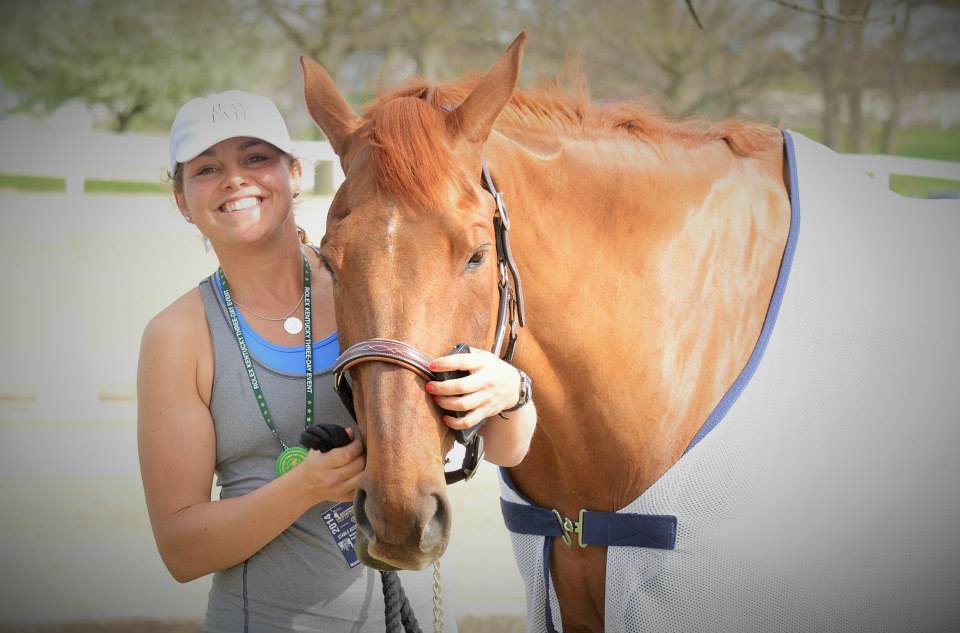
Meg and Manoir de Carneville. Photo by Sally Spickard.
Can you tell me about a time you’ve been burnout?
“I think burnout has manifested in different ways. When I was a groom, it would hit me in a more physical sense — the job was very physical and very stressful because everything I did affected Sinead directly and I took that very seriously. I think that kind of burnout requires you to have conversations attached to purpose and luckily Sinead was always open to those conversations.
“When you’re an employee, you want to do a good job, so it can be hard to open up about bigger picture things, like ‘can I financially afford this lifestyle?’ and, ‘do I want to do it forever?’. I make it very clear to my workers at the beginning that I want them there because they enjoy their jobs — but it’s going to change. What motivates you in your early 20s isn’t going to motivate you when you’re 25, 35, or 45. Facing that stuff can be very emotional when you don’t know if you want to be where you are.
“Now I don’t think I get so emotional when I’m burnt out because I know that I am doing what I want to. I did an office job for about six weeks between grooming and going off on my own and it was terrible. So now instead of asking myself ‘Is this what I am supposed to be doing?’, I ask ‘What do I need to do to find inspiration again?’
“Inspiration is a muscle that you need to exercise — it’s the fuel that keeps us going. The day-to-day can be mundane and boring but you can always actively seek sources of inspiration.”

Meg Kepferle and Anakin. Photo by Shelby Allen.
Can you tell me about another challenge you’re currently facing in the industry?
“On paper, I’m following a decent business model — I teach a ton of lessons and I have a reasonable number of horses in training. I’ve always been good at learning how to make things work financially, but it feels like this year has been really tough. I applied for a grant to go to Rebecca Farm, and I got it but I had to turn it down because I still wasn’t able to make the numbers work.
“I’ve always been the kind of person to take an opportunity, jump in with two feet and figure it out later — but I can’t do that this time because I didn’t properly plan for it. I think I’m at the point in my career where I’m going to have to sell a horse or two to keep going. I’ve never wanted to do that but I guess everyone does at some point. I get so attached to my horses, and while I’ve been lucky enough to have people help me buy them, I have to pay most of the expenses. People don’t talk about the fact that it can cost $50,000 to $100,000 a year to keep a horse going at the upper levels, especially one that is older and needs some maintenance. I have no regrets about spending the money I did to get the chance to ride at Kentucky this year, but I guess you can’t turn around and do it again and again and again without the other side of things coming in. My goal would be to have several FEI horses in the future and I’m still wrapping my head around how to make that possible.”

Meg Kep and Anakin. Photo by Jenni Autry.
What advice would you give to someone in the sport that is currently facing adversity?
“Everyone struggles. It’s part of being an athlete just as much as it’s part of being human. You have to get a little bit comfortable with being uncomfortable. If you go around thinking that the bad stuff only happens to you and nobody else, you’re going to be very unhappy in this sport.
“It’s easy to feel like your walls are closing in and everyone else is doing an amazing job, but I promise if you ask people around you, they’re going to be able to relate. Everyone sees the good and they don’t think the bad happens too. Those big moments are a very small part of this and they can’t be your only motivator because they don’t happen enough to sustain happiness. Enjoy the journey because each day is a challenge; financially, mentally, and physically.
“Adversity is part of the lifestyle and some days are going to be harder. Get creative. Learn. Pivot. Learn new skills and lean on your peers for guidance when needed. If you’re aiming for the sun, the closer you get, the hotter it is.
In the horse industry, I think it’s easy to get attached to the idea that there’s only one way to the top. It can feel like the second you have a setback or a failure you’re not cut out for it or you’re never going to make it.
Meg identified inspiration as a cure for burnout, but honestly, I believe that inspiration goes deeper than that. If you’re grooming at a five-star with the thought in the back of your mind that says “I could do this too one day”, that inspiration becomes part of your journey. You can constantly change, adapt and grow in this industry so long as you are inspired to do so.
When I was a young groom, I went to Meg’s birthday party at The Fork, and they played a slide show of all the amazing experiences Meg had had grooming for Sinead. That inspired me. This stuff is contagious, so if we can stay open and connect about how to get through the tough stuff, we can also continue to inspire each other to create opportunities for each other in the future!
Dr. Tyler Held EdD CMPC is a professional groom and Certified Mental Performance Consultant. You may have seen her over the last few years working for International 5* Jennie Brannigan or listened to an episode of her podcast, The Whole Equestrian.
Tyler started riding in summer camp at the age of 5 and essentially never looked back. She obtained her Undergraduate degrees in Animal Science and Equine Business Management from the University of Findlay in 2014. During this time, she spent her summers doing her first working student job at an eventing barn and quickly became obsessed with the sport. After experiencing some mental blocks in her own riding, she decided to focus more on grooming and learning more about Sport Psychology. In 2017 she moved to Chester County, PA to work as a Vet Tech and groom for Dr. Kevin Keane, which opened a lot of doors in the eventing community.
Just as she finished her Master’s Degree in Sport and Performance Psychology, she took the reins at Brannigan Eventing as head groom. Now partially retired from grooming, Tyler is focusing on growing her consulting business, Thought Quest Mental Performance Solutions, and helping Equestrian athletes navigate the mental challenges that come with the sport.










